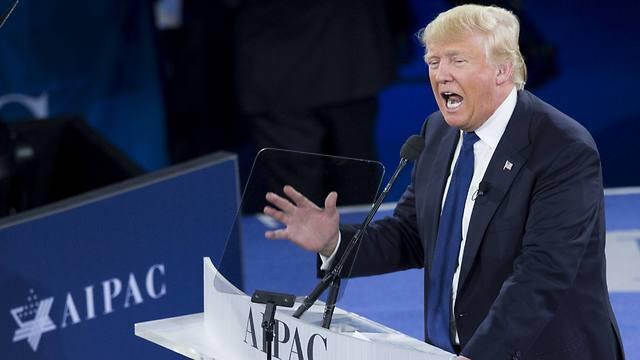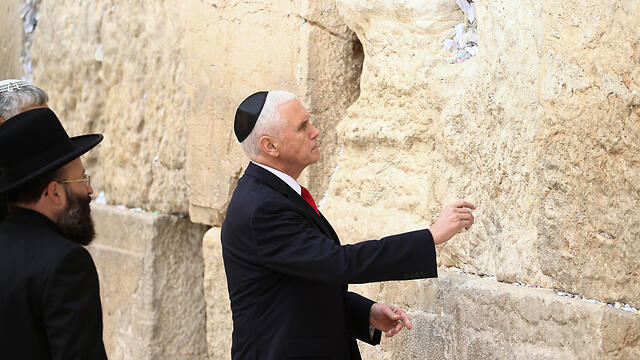Getting your Trinity Audio player ready...
For many years, we got used to hearing about the Jewish lobby’s mythical power in US foreign relations. The Jewish lobby was described by many as a dominant, aggressive power in American politics, and was linked to strength and conspiracies around the world, including in the Arab and Islamic world.
The lobby’s critics in America accused the Jews of selling out the values of democracy and liberalism for the sake of an aggressive and occupying Israel. Others argued that the Jews’ loyalty to Zion came at the expense of their American patriotism and was harming US interests in the Middle East and in other international arenas.
So how is it possible that while most Jews are hostile towards President Donald Trump’s administration, relations between Washington and Jerusalem are thriving? Why is an administration which most Jews are opposed to, and which doesn’t even listen to Jewish lobbyists, embracing Jerusalem this way and being embraced in return by the Israeli government in a way we have never seen before?
In President Barack Obama’s era, criticism against the Jewish lobby reached new heights, with claims that the lobby had gotten America entangled in Iraq and was damaging its image in the Arab world. The lobby was accused of preventing a solution to the Middle East conflict and an acceptance of Iran.
When Washington conveyed real hostility towards the Netanyahu government, it was often backed by “the alternative Jewish body” (J Street), which aimed to “balance” the “destructive” Jewish power of AIPAC, which allegedly supports Israel automatically against American interests.
During the days of Obama and Secretary of State John Kerry, AIPAC was forced to defend itself concerning the lobby’s strength, and when presidential hopeful Donald Trump addressed AIPAC in 2016, its leaders apologized when members of the audience stood up to applaud the controversial candidate.
Trump was elected, as we know, with minimal Jewish support. In the past year J Street has been shoved to the sidelines, and when the United States recognized Jerusalem as Israel’s capital, the organization sounded more like a Palestinian victim than like a pro-Israel organization. Even AIPAC itself seems like a restrained and toothless organization compared to Trump and Vice President Mike Pence’s enthusiasm towards Israel and its policy.
The reason for the decline in the Jewish lobby’s standing as a key player is the tectonic shifts that have taken place in the Middle East and in Israel in recent years. The Arab Spring failure, the Islamic State terror, the civil war in Syria, and of course the rise of the Trump administration, whose entire essence is to reverse Obama’s policy, have all changed the balance of power in America. The Israeli government no longer sees the lobby as a key asset in its national strategy either.
The lobby’s failure in the vote on Iran and AIPAC’s inability to restrain the Obama administration in the hostile Security Council vote served as proof to Jerusalem that the real alliance in America is with Christian conservative forces, which are perceived by the Israeli Right as more loyal and reliable than “the Jewish force.” Vice President Pence whispered as he mentioned the option of two states for two people, but when he said “Shehecheyanu,” we all felt the passion in the blessing stemming from real devoutness.
The conservatives and evangelicals in America realized long ago that they can count on right-wing Israel as an ideological and messianic ally, and they loathe the “universal hostility” of liberal Jews, who condemn not only the Israeli occupation but also American right-wing groups.
The decline of the traditional Jewish lobby reinforced the Jewish Orthodox forces in the US. Ambassador David Friedman and special envoy Jason Greenblatt represent the religious American Jewry, which is no longer apologizing for its “unliberal” Jewishness and isn’t afraid of an alliance with evangelical religious forces and with other conservative elements, which are sometimes identified by the liberals as “anti-Semitic forces.”
The dramatic changes taking place in Israel and the internal metamorphosis in America, both among the Jews and among the conservative and fundamentalist streams, are putting the alliance with Israel in a different place, which is weakening the traditional lobby’s role at this time.
Yossi Shain is the Romulo Betancourt Professor of Political Science at Tel Aviv University where he also serves as the head of the Abba Eban Program of Diplomacy and co-chair of the MA Program in Political Leadership.



